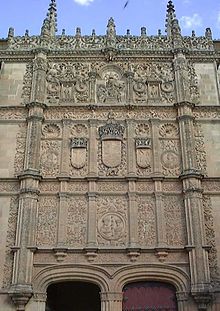Spanish late scholasticism

The Spanish late scholasticism , also called "second scholasticism ", was a theological, legal and philosophical current of Catholicism in the 16th century, which mainly originated in the countries of the Iberian Peninsula.
Although the designation as terminus technicus has established itself, it is imprecise in two ways: on the one hand, the current is not limited to Spain (which is why some speak of "Iberian late scholasticism") and, on the other hand, the "late scholastics" shared concerns of humanism .
Legal teaching
The Spanish late scholasticism, following on from the theology of Thomas Aquinas , initiated a renaissance of natural law and thus contributed significantly to the development of modern international law , which, following authors of the Spanish late scholasticism, Hugo Grotius (especially with De jure belli ac pacis ) brought to full development. In civil law , the influence of late Spanish scholasticism can be felt in the development of a theory of subjective law. In criminal law , the late Spanish scholasticism contributed to a subjectification of the concept of punishment ( Alfonso de Castro , Diego de Covarrubias y Leyva ).
Economic approaches
Some authors of the late Spanish scholasticism are of great importance in the establishment of classical economics , for example Martin de Azpilcueta , Tommaso de Vio (Tomasso Cajetan), Luis Saravía de la Calle , Juan de Lugo and Luis de Molina . In particular, Molinas De iustitia et iure and the work of Leonhardus Lessius based on it primarily determined the civil law teachings of the aforementioned Dutchman Grotius.
See also
literature
- Wim Decock, Theologians and Contract Law. The Moral Transformation of the Ius Commune (c. 1500-1650) , Leiden-Boston 2013.
- Marjorie Grice-Hutchinson, Early Economic Thought in Spain. 1177-1740 , London 1978.
- Paolo Grossi (ed.), La seconda scolastica nella formazione del diritto privato moderno , Milano 1972.
- Frank Grunert and Kurt Seelmann (eds.), The order of practice. New studies on late Spanish scholasticism , Tübingen 2001.
- Heinrich Kipp : Modern problems of martial law in late scholasticism. A legal philosophical study on the requirements of the right to war in Vittoria and Suarez (= Görres Society for the Care of Science in Catholic Germany . H. 68). Schöningh, Paderborn 1935.
- Josef Kohler, The Spanish natural law teachers of the 16th and 17th centuries , in: Archive for Legal and Economic Philosophy 10 (1917) p. 235ff.
- Harald Maihold, punishment for someone else's guilt? The systematization of the concept of punishment in the Spanish late scholasticism and natural law theory , Cologne a. a. 2005.
- Reyes Mate and Friedrich Niewöhner (eds.), Spain's contribution to political thinking in Europe around 1600 , Wiesbaden 1994
- Günther Nufer, On the doctrine of restitution of the Spanish late scholastics and their impact on the subsequent period , Diss. Freiburg im Breisgau 1969.
- Antonio-Enrique Pérez Luño, La polémica sobre el Nuevo Mundo. Los clásicos españoles de la Filosofía del derecho , Madrid 1992 (translation: The classical Spanish natural law doctrine in 5 centuries, Berlin 1994).
- Kurt Seelmann , The Iberian late scholasticism as a historical turning process , in: Klaus E. Müller (Ed.), Historical turning processes - ideas that made history, Freiburg u. a. 2003, p. 114ff.
- Kurt Seelmann , Theology and Jurisprudence on the Threshold of Modernity. The Birth of Modern Natural Law in Late Iberian Scholasticism , Baden-Baden 1997.
- Hans Thieme, Natural Private Law and Late Scholasticism ; in: Savingny Zeitschrift für Rechtsgeschichte, German Department 70 (1953), p. 230ff.
- Wilhelm Weber, Money and Interest in Spanish Late Scholasticism , Münster Westphalia 1962.
- Alejandro Chafuen, Faith and Liberty: The Economic Thought of the Late Scholastics (Studies in Ethics and Economics) , Lanham, Maryland / USA 2003.
- Emil Kauder, A History of Marginal Utility Theory , Princeton, New Jersey / USA 1966.
- Johannes Unterreitmeier, The public-law claim to compensation for pain and suffering as an expression of a general, constitutional claim to reparation. A renaissance of the scholastic doctrine of restitution , Diss. Munich 2007.
Web links
- Harald Maihold: The killing of the innocent, especially in war - guilt and arguments of benefit in the Thomistic moral teaching of the 16th century , in: Ancilla Iuris, from August 14, 2007
- Gideon Stiening: "Non est potestas nisi a Deo". Franciso de Vitorias Legal Doctrine in Context (PDF; 248 kB)
Individual evidence
- ^ Jan Dirk Harke : Roman law. From the classical period to the modern codifications . Beck, Munich 2008, ISBN 978-3-406-57405-4 ( floor plans of the law ), § 3 no. 1 f. (P. 27 f.).